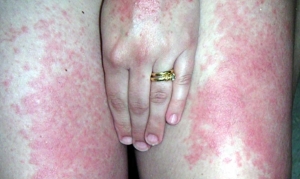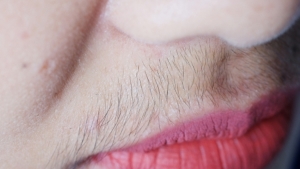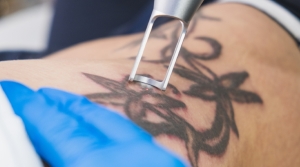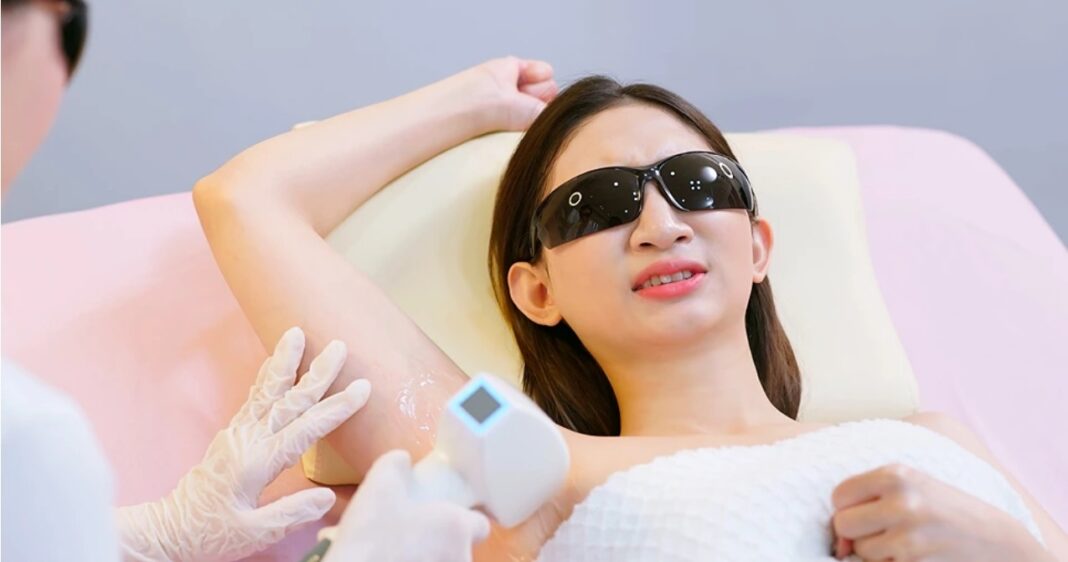Laser hair removal treatment is an effective and long-term solution to permanently get rid of unwanted hair, however, it is absolutely not a one-for-all. Before undergoing treatment, it is mandatory to get a detailed medical history to rule out certain health conditions, history of medications, and the ability of the skin to tolerate them should be considered as well. A sound knowledge of contraindications will assist you in making the right decision and also minimize adverse outcomes.
-
Skin Condition and Sensitivity
 Patients who are battling with chronic skin conditions like eczema, psoriasis, or even active infections should approach laser hair removal cautiously. The laser operates by the principle of attacking the pigment within the hair follicles and it can also affect sensitive or inflamed skin, thereby, increasing the chances of inflammation or exacerbating a pre-existing skin condition. People with photosensitivity should be carefully warned since laser energy operates by targeting pigment, and if a person’s skin is photosensitive, it will enhance the possibility of getting burnt or developing pigmentation after getting the treatment.
Patients who are battling with chronic skin conditions like eczema, psoriasis, or even active infections should approach laser hair removal cautiously. The laser operates by the principle of attacking the pigment within the hair follicles and it can also affect sensitive or inflamed skin, thereby, increasing the chances of inflammation or exacerbating a pre-existing skin condition. People with photosensitivity should be carefully warned since laser energy operates by targeting pigment, and if a person’s skin is photosensitive, it will enhance the possibility of getting burnt or developing pigmentation after getting the treatment.
Disorders of pigmentation, be it melasma or vitiligo, may be exacerbated by laser exposure. In these cases, even temporary pigmentation changes can have lasting effects, therefore, consultation with a dermatologist is essential before treatment.
-
Recent Sun Exposure and Tanning
For those who have recently undergone tanning or received considerable exposure to the sun, it may be better to avoid getting laser hair removal. Laser targets melanin which is responsible for the pigment in hair roots, and tanning increases melanin concentration in the outer layer of the skin, boosting the likelihood of developing burn, blistering, and discoloration. To reduce such risks, it is recommended to stay out of the sun for at least 2 weeks before and after the procedure.
-
Hormonal Disorders and Hair Growth
 Hormonal disorders such as polycystic ovary syndrome (PCOS) and disorders of adrenal glands can also cause excessive hair growth. Even though laser hair removal helps in the reduction of unwanted hair temporarily, these underlying conditions can make it difficult to achieve desired or long-term results. Therefore, in such cases, the patient should be duly counseled so that the expectations are realistic.
Hormonal disorders such as polycystic ovary syndrome (PCOS) and disorders of adrenal glands can also cause excessive hair growth. Even though laser hair removal helps in the reduction of unwanted hair temporarily, these underlying conditions can make it difficult to achieve desired or long-term results. Therefore, in such cases, the patient should be duly counseled so that the expectations are realistic.
-
Active Infections and Viral Conditions
It is important to know if you have any infections or viral diseases before you decide to have laser hair removal done. Various viral infections such as herpes simplex, commonly referred to as cold sores can get reactivated due to laser heat especially if the treatment is done on the face area. To reduce the likelihood, those who have herpes should consider taking an antiviral drug as prophylaxis when going for a laser appointment
Bacterial infections are another concern. If you have an active infection in the area where laser treatment is planned, it’s essential to wait until the infection has fully cleared to avoid complications. This precaution helps prevent the spread of bacteria and reduces the risk of post-treatment scarring. It is never advisable to perform a laser on an actively infected area.
-
Certain Medications
 The medications that you are taking play a pivotal role in determining your suitability to undergo laser hair removal. Some drugs increase photosensitivity, increasing the skin’s reaction to laser light and making burns more likely. Here are some specific medications to discuss with your healthcare provider:
The medications that you are taking play a pivotal role in determining your suitability to undergo laser hair removal. Some drugs increase photosensitivity, increasing the skin’s reaction to laser light and making burns more likely. Here are some specific medications to discuss with your healthcare provider:
– Isotretinoin (Accutane): It is a commonly prescribed medication for acne, but it can increase skin sensitivity for up to six months even after discontinuation. Patients on Accutane should avoid laser hair removal due to an increased risk of developing scarring,and burns, and it takes a longer healing time as well.
– Antibiotics: Many antibiotics, including tetracyclines, are photosensitizing. They make the skin more susceptible to burns, so it’s generally advised to wait at least a week after completing an antibiotic course before undergoing laser treatment.
– Anticoagulants: Blood-thinning medications, like warfarin, may increase the risk of bruising and bleeding under the skin. Because laser treatment generates heat that can cause minor trauma to treated areas, those on anticoagulants might be advised against it.
– Hormonal Treatments: Hormone replacement therapies or oral contraceptives can also influence hair growth and the response of our skin to laser treatments, therefore, informing to your doctor is essential before going for the treatment.
Patients on any photosensitizing medication should consult their physician about alternatives or delay laser hair removal until they’re no longer taking the medication.
-
Pregnancy and Breastfeeding
Even though laser hair removal is safe most of the time, it is preferably advised to not go for it during pregnancy and breastfeeding. It can be attributed to the hormonal fluctuations during these periods which affect the sensitivity of the skin and bring changes in the pattern of hair growth, potentially causing suboptimal results. Furthermore, while no studies or literature has categorically proven it to be harmful, most professionals prefer to stay safe, avoiding any treatments that are not really essential until after breastfeeding concludes.
-
Immunocompromised Individuals
 People with weak immune systems, such as the ones suffering from HIV or the ones who have undergone organ transplants recently are at a higher risk of developing complications after laser hair removal. Healing may take longer, and there’s an increased risk of infection as well. Consulting a dermatologist is essential to know whether laser treatment is appropriate in these cases.
People with weak immune systems, such as the ones suffering from HIV or the ones who have undergone organ transplants recently are at a higher risk of developing complications after laser hair removal. Healing may take longer, and there’s an increased risk of infection as well. Consulting a dermatologist is essential to know whether laser treatment is appropriate in these cases.
-
History of Keloid Scarring
It is also important to note that if you have keloids which are thick, raised scars that form at the site of the wound, laser hair removal might not be possible. Lasers work by focusing light on small areas to burn target hair follicles, but in keloid-prone people, this can result in even more scar tissue production. It is always advisable to discuss your scar history with a dermatologist who will then advise you on the best method to use for removing your hair.
-
Tattoos in the Treatment Area
 Laser hair removal over tattooed skin is generally avoided. Laser targets pigments, which means that it can affect tattoo ink as well, which can lead to developing discoloration, fading, or even blistering at times. Therefore, if you have any tattoos, avoid getting that area treated with a laser.
Laser hair removal over tattooed skin is generally avoided. Laser targets pigments, which means that it can affect tattoo ink as well, which can lead to developing discoloration, fading, or even blistering at times. Therefore, if you have any tattoos, avoid getting that area treated with a laser.
Taking a Cautious Approach
Laser hair removal is a popular and effective treatment practiced worldwide but it should be kept in mind that is not for everyone. There are certain factors associated with overall health and medical history must be considered. Consulting with an experienced dermatologist ensures that your needs in accordance with your medical history are carefully evaluated to avoid adverse outcomes. With a personalized approach, laser hair removal can be a safe, effective way to manage unwanted hair—provided it is done with caution and under professional guidance.
By considering these conditions and contraindications, you can make a well-informed choice about whether laser hair removal is right for you. Always be open with your doctor about your medical history, current medications, and any specific concerns. Hiding anything from your dermatologist is going to adversely affect you. When chosen thoughtfully, laser hair removal can offer impressive results without compromising your skin’s health.
References
- https://www.skinperfectionlondon.co.uk/2024/05/who-should-avoid-laser-hair-removal/
- https://sureaesthetics.co.uk/the-complete-list-of-laser-hair-removal-contraindications/
Author Bio:
Dr. Ahsan Farooq Khan is a physician and a senior clinical fellow in dermatology. After completing his postgraduation in medicine, he completed his training in the sub-specialty of dermatology. He has considerable experience in diagnosing and treating a myriad of patients with dermatological issues. Dr. Khan has a special knack for aesthetic medicine and he is highly trained and well-equipped to deal with energy-based devices. He has been performing procedures with lasers for a couple of years now and he has treated many patients successfully for hirsutism scars and various other issues with the help of various modalities of lasers. He is also a research enthusiast and recently secured first position in the biggest annual international conference of dermatology in his country.

 By Laura
By Laura







